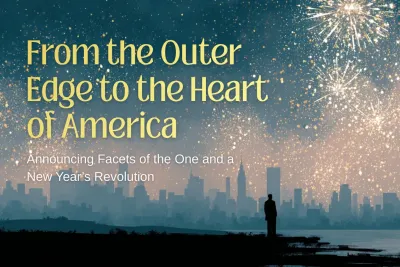Old Wine, New Wineskins: Why Fresh Water Revives Ancient Roots
King Josiah: a leader who, sensing the drift of his nation, returned to the very foundations of faith. He found the ancient Book of the Law, tore his clothes in mourning, and set about to recapture true values. Josiah’s path was one of restoration—of digging up old seeds, dusting off forgotten stones, and making the ancient new again.
But what happens after you uncover the old? What’s next, when the letter of the law has been found but the world around you—your own heart included—presses forward into a future never before imagined?
This is the tension Jesus addresses with the parable of the old wine and the new wineskins:
“No one puts new wine into old wineskins. If he does, the new wine will burst the skins—and both the wine and the wineskins will be ruined. No, he pours new wine into new wineskins.” (Mark 2:22)
Here, Jesus is not championing novelty for its own sake. He recognizes, as Josiah did, that the seeds of spiritual truth—planted by God—require not just safe storage, but active care, renewal, and above all the right environment to flourish. What germinates must be tended with living water and clear sunlight; old containers can’t always hold what is newly alive.
A Cleansing Before Renewal
Between Josiah’s rediscovery and Jesus’ new wine, there lies another crucial step: purification. Before new growth can take root, the old vessels—corrupted, commercialized, or simply emptied of meaning—must sometimes be cast out entirely.
We see this vividly in Jesus’ dramatic cleansing of the Temple. He doesn’t merely tsk-tsk the worldly practices encroaching on holy ground; He fashions a whip, flips tables, and drives out the moneychangers:
“My house shall be called a house of prayer, but you have made it a den of robbers.” (Matthew 21:12–13)
This is the shock of real spiritual renewal. Sometimes, before God can pour forth anything new, He must sweep the old—its idols, pretense, and transactional pieties—clean from our lives and communities.
In The Hardness of the Heart, I wrote about the way religious systems, when unexamined, easily calcify:
“We worked backward through Christianity to connect with the Old Testament... seeking to obey the law while following the guidance of the Spirit, in faith. But we limited our reinterpretation of it by minimizing the fact that Christ’s covenant... had in many ways an opposite focus. Christ warned about old wineskins being burst with the expansive fermentation of the new wine.”
—The Hardness of the Heart, p. 72
It’s not enough to find the law; we must let God’s Spirit upend our attachment to forms that can no longer transmit life.
From Letter to Spirit: “But I Say Unto You…”
Still, even cleansing—even zeal—doesn’t bring the new on its own. Jesus, standing in the tradition of Moses, goes further. He doesn’t abolish the law, He amplifies it—penetrates to its seed, its spiritual DNA.
“You have heard that it was said... ‘You shall not commit adultery.’ But I say to you that anyone who looks at a woman with lust has already committed adultery with her in his heart.” (Matthew 5:27–28)
The same goes for murder, and every commandment. The law forbade the act; Jesus forbids the root impulse: the anger, the envy, the covetous glance. Every external transgression begins as an inward movement—a whisper in the hidden places of the soul.
“Even adherence to the divine clock (i.e., Sabbath and Holy Days) was secondary to the light that shined forth from the people who followed them. Christ outlined this... in His famous Sermon on the Mount.”
—The Hardness of the Heart, p. 125
This is a move not away from the commandments, but deeper into their intent. Idol-worship is not just about statues—it’s any false concept of God, anything we substitute for the living reality. Coveting isn’t just wanting your neighbor’s oxen today; it’s that restless spirit, never satisfied, always longing, that blocks gratitude and poisons community.
These are seeds planted in the Ten Commandments. But as any gardener knows, a seed will not grow if it is left buried in dry earth.
Living Water and the Light of a New Day
So what brings these seeds to life? Jesus spoke plainly:
“If anyone is thirsty, let him come to me and drink. Whoever believes in me, as Scripture has said, rivers of living water will flow from within them.” (John 7:37–38)
And the Bahá’í Writings echo this truth: the Word of God is the foundation, but the outpouring of fresh revelation is the living water that causes those buried truths to break open and grow. Bahá’u’lláh speaks of this progression:
“The religion of God is the One Religion, and all the Prophets have taught it, but it is a living and growing thing, not lifeless and unchanging... The bud scales must fall in order that the flower may bloom, and the petals must fall that the fruit may grow and ripen.”
—Dr. Esslemont, Bahá’u’lláh and the New Era
This applies to scripture, to tradition, to our own hearts. If we cling to the old wineskins—old forms, old prejudices, the comfort of spent vessels—we risk losing both the vessel and the Spirit’s new wine. But if we open ourselves to living water, God’s Revelation comes—sometimes as a cleansing flood, sometimes as a gentle rain—and the law that once sat in stone or ink springs up as living fruit: love, justice, self-restraint, unity.
The Law Remains, but as a Garden Now Alive
It is not about discarding the law, nor exalting change for its own sake. The Ten Commandments remain—roots in the soil of every civilization. But they beg for water, for sunlight, for the breath of a new day. They must be understood as living principles, whose full intent is revealed only when the Spirit pours forth anew.
In my own journey—whether studying at Ambassador College, confronting my tradition’s limitations, or embracing Bahá’u’lláh’s progressive Revelation—I have learned: God’s growth in us is never a matter of choosing between past and present, but of letting living water revive the ancient roots and bring forth fruits unimagined in former seasons.
Let us then:
- Rediscover the Book, like Josiah.
- Cleanse the temple of our hearts, like Jesus.
- Welcome the wine of the Spirit in new vessels.
- And remember: All true renewal begins with the seed God has given, but none flourishes without the living water He pours in every age.






